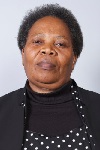
What is your political background? How did you come to join your political party and become an MP? My political interest and activism started with the release of Govan Mbeki, Walter Sisulu and Raymond Mhlaba. At the time they were doing underground campaigns in the Eastern Cape raising political awareness. In Bizana, when Mandisa Marasha and Ntombi Mabhude also started looking for female activists and women with an interest in politics, I then formally started participating in politics. At that time in our history the ANC Women’s League (ANCWL) had not been established in Mthatha and I joined the Vukani Women’s Organisation (VWO) and we were actively championing women’s issues until 1990. With the unbanning of political parties I officially joined the ANC.
I was then working as an administrator and had been appointed organiser for the ANC in Lusikisiki. In 1991, I was employed as the ANCWL organizer for the Mthatha region when it was under the leadership of Mrs Sisulu, Ms Baleka Mbethe, Mrs Tambo and Mrs Nosiviwe Nqakula when she was the head of organising for the ANCWL.
In 1991 the ANCWL was officially launched in Durban with Winnie Madikizela Mandela as its first president. During that time I was elected into the Transkei Regional Executive Committee of the ANC. With the transition from homelands to provinces and amalgamation of regions I was elected into the Provincial Executive Committee (PEC) of the ANC which was led by Mr Dumisani Mafu. Before moving into that role I had been moved to organising for the ANC mother body in the Butterworth region. I have also organized inthe Alfred Nzo Region during the time when from 1999-2004 I was working with Mr Mbulelo Sogoni and other leaders.
In 2004 I was deployed in the Eastern Cape Provincial Legislature as a whip where I have served in varied committees including social development, education, roads and public works, transport, office of the premier (OTP) and the multiparty women’s caucus. In 2014 I was then deployed in the National Council of Provinces.
What does your job as an MP entail? On Mondays I can be found at my constituency where I service about 11 wards. On Tuesday I attend the Social Services Select Committee and on Wednesdays I attend the Education and Recreation Select Committee. On Thursday it is party caucus in the morning so that the afternoon without plenary is dedicated to administration. On Fridays I return home
What are you finding most challenging about the Fifth Parliament? Management of legislatures is different from the NCOP because legislatures are empathic and supportive. When we arrived in 2014 we struggled with office space and support services from secretaries to researchers; such that that support eventually came from the home province. Committees in the NCOP oversee more departments and entities compared to provincial legislatures.
What obstacles prevent Parliament from doing its work and how would you fix it? To date I have not engaged in any new substantive policy deliberation but we certainly engage in law making and have passed quite a few bills.
Does Parliament do a good job of holding the Executive to account? If not, what can be done to improve this? We do struggle a bit and there is certainly room for improvement because sometimes Ministers do not come to committees as often as we would like them to.
Are you happy with the proportional representation system or are you in favour of electoral reform? If we were deployed according to constituency numbers we would account better even at national level. For example, one can find that the Port Elizabeth region constituency numbers were less than other regions but you find that PE would have more national deployees to Parliament. I would certainly like electoral reform to start at that level, certainly internally within political parties. At local government I would also make direct constituency based election mandatory, as that would better accountability.
Is Parliament’s public participation model adequate/ robust enough that it affords enough public participation before a law is passed? No it is not and certainly can be improved.
What are you passionate about? This applies both in a political/professional arena as well as personally? I am a social activist by nature - I would be serving in social services informally or formally
What is your message to South Africa? We need to start teaching people about democracy and what public participation is all about and the obligations and responsibility that come with that: governance is by the people for the people.
To learn more about this member, visit her profile.

Comments
Keep comments free of racism, sexism, homophobia and abusive language. People's Assembly reserves the right to delete and edit comments
(For newest comments first please choose 'Newest' from the 'Sort by' dropdown below.)